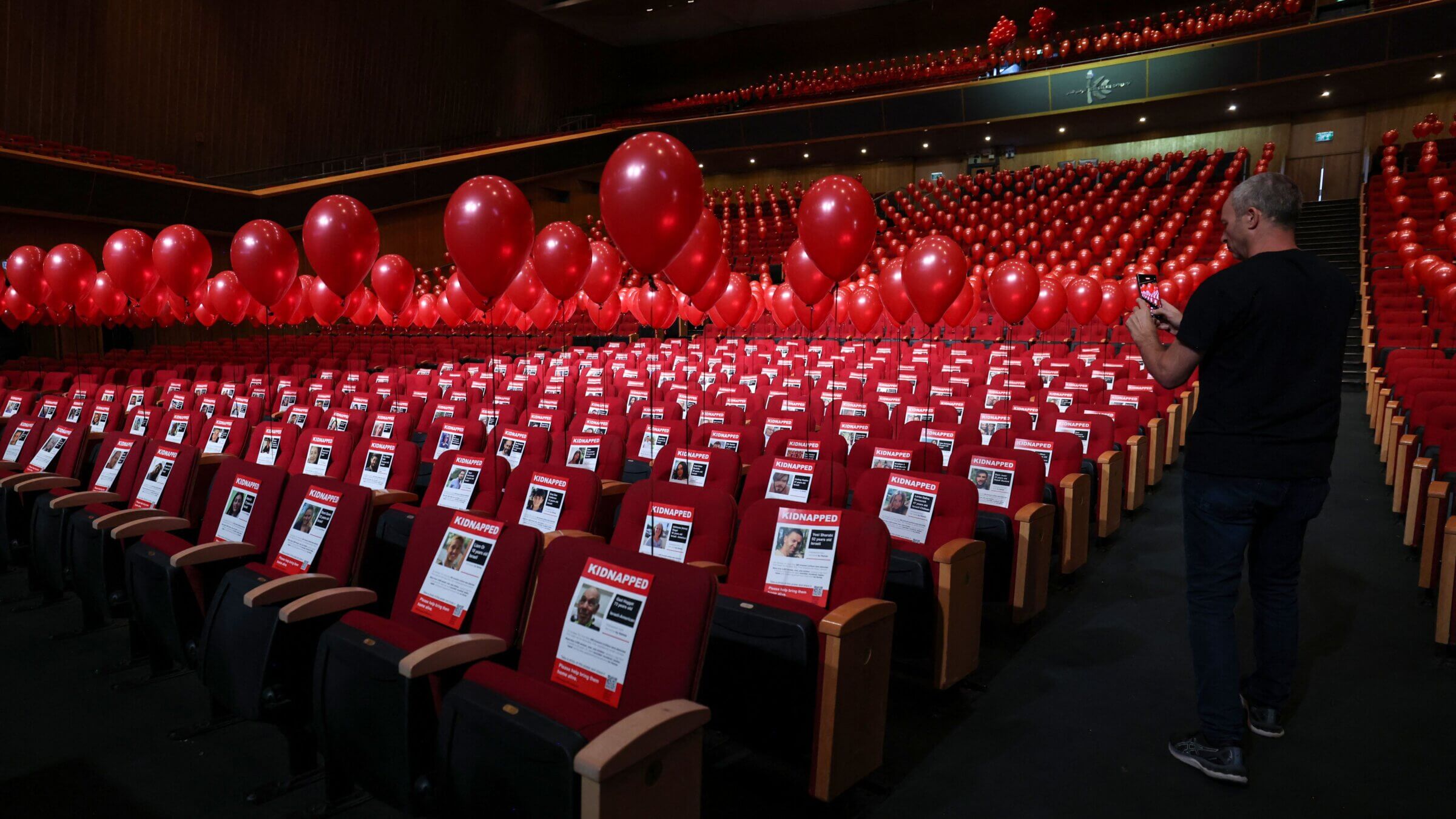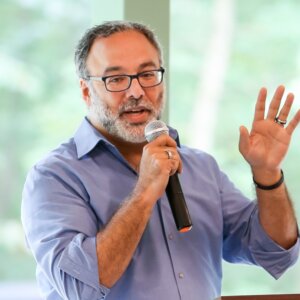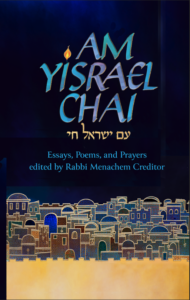The first anthology of writing about the war is an outpouring of poetry and anguish
Rabbi Menachem Creditor’s ‘Am Yisrael Chai: Essays, Poems, and Prayers’ was born out of the blur that followed Oct. 7

An installation of balloons and pictures of Israeli hostages abducted by Palestinian militants during the Oct. 7 attack. Photo by Getty Images
Rabbi Menachem Creditor wishes he’d never had to publish this book. And he hopes he won’t have to edit any more like it in the future.
In the introduction to Am Yisrael Chai: Essays, Poems, and Prayers — the emergency anthology he compiled and released last week in the wake of the recent Hamas attacks on Israel — he opens with this overwhelming sentiment: “I can’t write this introduction. I don’t want to. It was never meant to be written. Just like this book was never meant to be created. It just hurts so much.”
“Recording our raw emotions in the moment is really important,” said Creditor, who is a scholar in residence at UJA-Federation New York and was the founder of Rabbis Against Gun Violence. “So this is a yelala, a primal moan of our people,” he added, using the Hebrew word for a wail or howl of emotion that must be released. “We deserve to be heard, we need to be heard.”
An emergency anthology
The anthology was born in the blur that followed Oct. 7. “My phone started blowing up with notifications, and I knew something was wrong,” Creditor said. There were news reports and texts from friends. He checked in with family in Tel Aviv. He went back and forth with his UJA colleagues. And perhaps for the first time in the organization’s history, Creditor said, the executive committee convened on Shabbat to discuss and allocate emergency funds.
“We didn’t understand the magnitude, but we did understand that this was about an unprecedented loss of life in Israel,” Creditor said.

Creditor says he can barely remember those first few days. Nearly three weeks later, when we spoke over the phone, he said he’d been on call non-stop and still barely knew what day it was sometimes. But as he saw early outpourings of words and feelings, he knew what to do. He’d done it before.
“I’ve published many books, and many of them are responses to tragedy,” he said. There was the anthology he compiled in the wake of the 2014 Gaza War — the first in what’s become a grim sort of series — and more recently the one that followed the Colleyville synagogue hostage crisis. “The mechanism for this is easier than facing the contents of it,” he said. “Purpose is really stabilizing.”
Five days after the war began, Creditor put out a call on social media for submissions to this latest anthology, with a strict deadline four days after that and a note that all proceeds would support UJA-Federation of NY’s Emergency Israel Campaign.
Hundreds of submissions flooded in from all over the U.S., as well as Israel, Canada, Sweden, and elsewhere. “Many entries talk about the inability to sleep. Many entries talk about shock. Many entries talk about fear,” said Creditor. “Almost every poem was painful. No prayer was confident. And the essays also weren’t definitive.” To him, the submissions emphasized a sense that “there’s nothing to hold on to right now, except the idea that am Israel chai, this commitment to survival, this commitment to facing all odds and living.”
As Creditor swiftly reviewed, categorized, and organized the submissions, his friend Joanne Fink offered to provide artwork for the cover. Just 10 days after that Shabbat morning unlike any other, the manuscript was finished. Last week, the collection of testimony became available for anyone to purchase.
The speed was intentional, Creditor said. “If I gave it more time, the sharpness would fade.”
A collection of voices
Chaya Lester wrote the first of her “War Poems” on Sunday, Oct. 8. She called it “The Mourning After.” The American-born, Jerusalem-based psychotherapist recounts walking the dog that morning and encountering the altered world around them. In one section, she writes:
first it’s Moshe down the street
he slouches into the bench
drowned in his phone, he moans
we rush to his side
he can not speak, nor can we
he finally lifts streaming eyes
and tells us his friend’s son
was just confirmed
slaughtered
at the festival in the South
we are speechless
and hold his grief
a tender but distant tragedy
and then he says,
‘wait, you knew him too’
and it’s true
the son of our friend
we mourn together on the empty street
murmur condolences
and stumble forward with the dog
“What prompted it was the just enormity of what my mind was trying to process,” Lester told me. “Writing for me has been a stronghold in this shocking time. It’s my first line of defense against the trauma of it all.”
Thousands of miles away, Rabbi Debi Wechsler of Baltimore’s Chizuk Amuno Congregation was occupied at first with how to respond to the moment and care for the congregation at services on Shemini Atzeret and Simchat Torah in addition to a special service of comfort and support held at the synagogue on the Monday after the attacks.
“I was speaking and reacting publicly and engaging very much in my rabbinic persona,” she told me. It took a few days before she could begin to engage with what had happened on a more personal level. “Writing is one of the ways I try to make sense of the world, so on Tuesday I sat down to untangle my thoughts in front of the computer.”

“We can never unsee and unknow what we have seen and what we have come to know since Saturday morning,” she wrote. “As a rabbi I see a lot of death, most of it after a full life lived. It’s difficult to process the constant exposure to, and engagement with, death. But what I’ve seen, what we’ve seen in the past four days is unprecedented horror and callous disregard for human life. There is no processing or making sense of this.
“And yet there is beauty. Heartbreakingly, achingly beautiful moments and stories and images both from here and abroad.”
Moshe Lencer, the Ann Arbor-based Associate Director of Partnership Development at the iCenter, writes in his essay, “In Hebrew, there’s a saying…which translates to ‘The people of eternity are not afraid of a long journey.’ This journey will undoubtedly take time, but the Jewish people will emerge from this dark chapter stronger and more resilient than ever before. As we share our personal reflections and join hands in the pursuit of peace, there is a collective hope that brighter days lie ahead.”
When I asked him about his essay, Lencer, who is originally from Herzliya, called his writing an “instinctual response to the emotional turmoil” that also became a chance to comfort others, instill hope, and inspire action.
“While it candidly depicts the human cost of conflict, it also highlights the enduring power of hope and collective action in the face of adversity, leaving readers with a caring reminder to embrace empathy and work together for a more peaceful world,” said Lencer. “It’s a reminder that, as individuals, we have the capacity to influence change and make a positive impact.”
Something to hold in your hands
The anthology is a yelala, as Creditor described, an almost involuntary howl of sorrow captured in vivid poetry, prayer and prose. It’s a collection of urgent testimony and a means of coping with what feels huge and inexplicable for both the contributors and the readers who pick it up.
“My hope is that they will find themselves in the pages, find their raw hearts reflected in words,” Creditor said.
And though he wishes there’d never been a reason to publish this book, Creditor believes “there’s a need for something that isn’t social media and rapidly changing and exceedingly graphic headlines and images,” he said. “This is a chance to process things in a slightly slower fashion. Something to hold in your hands.”






















